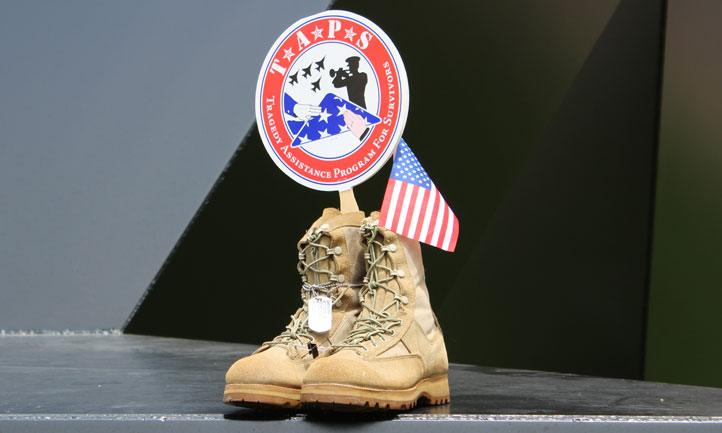The Care We Took
Author: Matt Mabe
In the latter half of my second tour in Iraq in 2006, I took over as my battalion's adjutant, a staff promotion I'd been waiting for. In the Army, the adjutant is a unit's human resources officer, the person in charge of personnel-related administrative matters like pay, leave, promotions, awards, and discipline. In a combat environment, however, the adjutant has an added responsibility: overseeing the process for handling a unit's casualties.

My battalion's tour in 2006 placed my fellow soldiers and me in one of the most dangerous areas of Iraq during one of the darkest periods of the war. We were based in Ramadi, a violent city in Al Anbar province and an epicenter of the country's insurgency. Our battalion's mission was to clear the city's roads of improvised explosive devices: grueling and dangerous work. Attacks on our platoons came daily.
From the start of my new job, my staff set about processing the unit's steady stream of wounded soldiers. In the tragic instances when soldiers died, there were the requisite investigations, reports, and paperwork. The Army's automatic and highly controlled notification process took care of getting the devastating news home to families. A personalized letter of condolence from the battalion commander was customary and followed shortly afterward.
Meanwhile, battle buddies and platoon mates began the somber process of sifting through and cataloging the deceased's personal belongings: family photos, knick knacks, laundry, souvenirs purchased at the local bazaar, half-written letters home—the material remnants of an honorable life cut short. This duty was at once cathartic and sacred. It allowed us to get to know our comrades in ways we hadn't before, through the prism of their relationships with loved ones back home.
We all felt proud to handle our soldiers' possessions with the honor they deserved. Most of us realized we would never meet the families on the receiving end, so it was even more important to ensure that items were fixed, cleaned, neatly arranged, and above all respected. All of this was a crucial part of the proper process for sending off America's finest warriors. It was necessary for our own well-being, too.
All our soldiers' deaths were followed immediately on the basecamp by meaningful vigils that captured the fullest measure of their character and their devotion to country. According to military custom, portraits of the fallen were displayed next to boots, rifles, and tags. Speeches were delivered by officers and close friends. Roll was called, with the deceased's rank and name answered only by lingering notes of silence. Prayers were offered. Afterward, appropriate periods of mourning were observed.
This is how our grief journey began.
All soldiers in the battalion grieved in their own ways, but for battle buddies, the losses were particularly painful. There was shock and sadness, guilt and regret. There was also a job to be done and other soldiers' lives on the line. Indeed, resilience often comes from the act of confronting one's loss and grief in direct and purposeful ways—and many of us found that getting back to work was a powerful antidote to the experience of crushing loss. I was always proud of how bravely battle buddies and platoon mates refocused on the task at hand, even as I quietly worried about the long-term psychological and emotional effects on them.
Fortunately, institutional support was always on hand immediately. Chaplains and healthcare providers helped surviving soldiers work through the pain, heartache, and trauma—at least for those who sought it.
But soldiers are blessed to have another support system for confronting their grief and achieving long-term resilience: They have each other. The bonds forged in training and combat among members of small military units can be as strong as the ties that bind families. Therefore the shock of loss and the paths to healing are similar in nature and intensity to those experienced by families themselves. Bonds among fellow soldiers are connections that last lifetimes, and they do so because of the sacrifices of the fallen. Every death in the tribe is memorialized and honored in ways that should give surviving loved ones hope and make them swell with pride.
Still, years later, with the sounds and fury of war a fading memory, I am reminded that for some—particularly veterans like me who have wandered from the tribe and thereby lost that vital connection to supportive peers—the battle continues. Resilience is not a straight-line trajectory. It doesn't go up and up and up. It takes time and patience and reflection and work. But no matter how painful the incident of loss or how difficult the road to recovery from it, there is always hope.
For nearly a quarter century, TAPS has helped thousands of families on their path to healing and ultimately resilience. And it is focused now on doing the same for battle buddies who might be wracked by the guilt or grief that springs from wondering, "Did I do enough?" "Why him and not me?" "Will I ever get over not getting to say goodbye?"
For me personally, joining TAPS as staff has forced me to revisit some of the more painful episodes of my military service, like learning after my first tour in Iraq that my best friend from West Point killed herself and the devastation of losing the best soldier I ever knew in an electrical fire in Ramadi. TAPS has helped me find meaning through honoring the selfless sacrifices of the fallen and to find peace in my reflections on their extraordinary lives. I have learned that resilience isn't about being tough in the face of adversity. It's about owning one's grief and deriving purpose from the tragedy.
From the pen of…
Matt Mabe, a former Army officer and journalist and a veteran of the wars in Iraq and Afghanistan, is the director of strategic operations for the TAPS suicide prevention and postvention initiatives. He lives in Philadelphia with his wife and two daughters.
